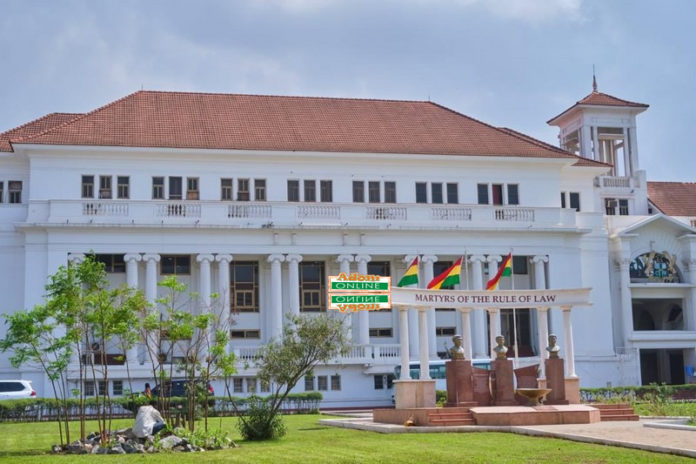The Supreme Court has dismissed an application by activist Oliver Barker-Vormawor, which sought to invoke the jurisdiction of the apex court to compel National Security Minister, Albert Kan Dapaah to answer 17 questions in an ongoing defamation case at the high court.
Albert Kan Dapaah has brought a GH₵10 million defamation suit against Oliver Barker-Vormawor over allegations by the activist that he was offered $1,000,000 by the cabinet in a bid to get him to stop leading the #FixTheCountry movement from organizing protests against the regime.
Kan Dapaah refused to respond to the 17 questions put to him by the appellant at the high court.
According to the appellant, these questions are questions of fact that would clarify the suit filed by the National Security Minister at the high court.
Thus, the appellant prayed the apex court to grant an order for the minister to provide information, facts, and documents pursuant to Article 19(5) of the 1992 Constitution.
Lawyers for Oliver Barker-Vormawor also wanted the court to determine whether the particular facts should be disclosed by the minister (Plaintiff/Respondent) to assist in the trial at the high court.
Dr. Justice Srem Sai, in his argument, quoted Order 23 of CI 47 to support his request that the Supreme Court compels the National Security Minister to produce documents.
Ordinarily, the Attorney General’s Department should be representing the National Security Minister in court, as he declined to divulge information citing national security confidentiality and oath of secrecy.
He argued that answering those questions would compromise his official duty and the security of the state.
However, Albert Kan Dapaah is represented by a private attorney, Bright Okyere Agyekum.
Making his legal argument, Bright Okyere Agyekum posited that the jurisdiction of the court was not properly invoked by the appellant.
He also referenced Article 135 and argued that the appellant failed to reference specific official documents they wanted the court to compel the National Security Minister to produce.
He further argued that the appellant filed an application for facts but not for specific documents.
He thus prayed the court to dismiss the application because the appellant is “on a fishing expedition.”
The appalent he rounded up” is fishing at the High court and wants to fish further at the apex court. The application should be dismissed.”
Article 135 of the 1992 constitution is clear, that application for the provision of official documents will be heard in chambers.
However, the panel, according to the Chief Justice who presided over the case, took the decision to hear the matter in open court because there were no mention of specific official documents by the appellant.
In the view of the court, the questions put to the National Security minister by Oliver Barker-Vormawor through his lawyers, are “questions thrown at large” without date and time.
Chief Justice Gertrude Tokornu in explaining the difficulty the court had with the application, pointed out that even if the court agreed and granted the application, it was going to be “difficult in crafting the order”, and enquired why the appellant came to the Supreme court under article 135 but failed to state the specific official documents they wanted to be disclosed by the Respondent.
The court further held that Article 135, the premise on which the appellant went to the Supreme Court, is not a tool for fishing, referencing the infamous Watergate controversy which ultimately resulted in the resignation of President Nixon of the United States.
The panel of five judges pronounced that in that case, during which a similar article in the US was invoked, the appellant asked for some tapes and recordings to be produced, something the activist and his lawyers failed to do.
Delivering the ruling, Chief Justice Gertrude Tokornu said “after considering the application, the court sees no reference to identifiable documents. Application is deemed unsupported and dismissed.”
With the ruling, the defamation case at the high court will continue without the National Security minister answering those seventeen questions.
ALSO READ:

